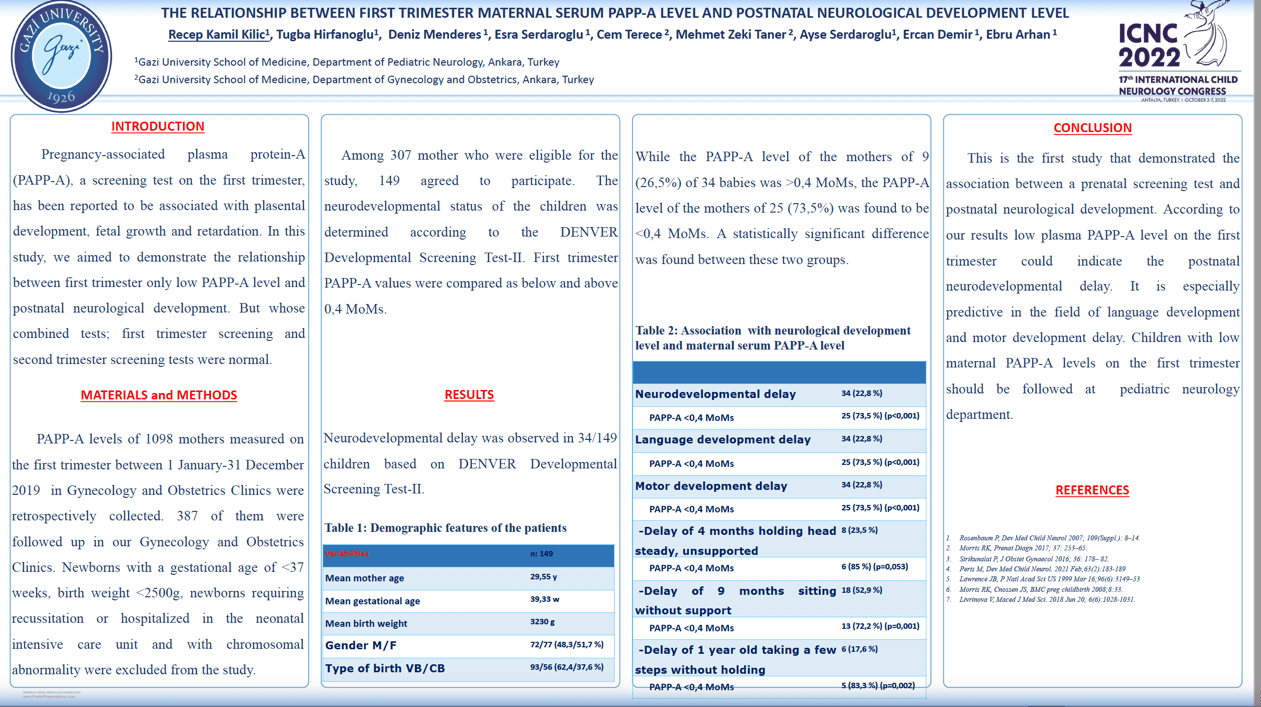THE RELATİONSHİP BETWEEN FİRST TRİMESTER MATERNAL SERUM PAPP-A LEVEL AND POSTNATAL NEUROLOGİCAL DEVELOPMENT LEVEL
Recep Kamil Kilic, Tugba Hirfanoglu, Deniz Menderes, Esra Serdaroglu, Cem Terece, Mehmet Zeki Taner, Ayse Serdaroglu, Ercan Demir, Ebru Arhan
Objective: Pregnancy-associated plasma protein-A (PAPP-A), a screening test on the first trimester, has been reported to be associated with plasental devolepment, fetal growth and retardation. In this study, we aimed to demonstrate the relationship between first trimester low PAPP-A level and postnatal neurological development.
Material and Methods: PAPP-A levels of 387 mothers measured on the first trimester between 1 January-31 December 2019 in Gynecology and Obstetrics Clinics were retrospectively collected Newborns with a gestational age of <37 weeks, birth weight <2500g, newborns requiring recussitation or hospitalized in the neonatal intensive care unit and with chromosomal abnormality were excluded from the study.Among 311 mother who were eligible for the study, 147 agreed to participate. The neurodevelopmental status of the children was determined according to the DENVER Developmental Screening Test-II. First trimester PAPP-A values were compared as below and above 0,4 MoM.
Results: Neurodevelopmental delay was observed in 32/147 children based on DENVER Developmental Screening Test-II. While the PAPP-A level of the mothers of 9 (28.1%) of 32 babies was >0,4 MoM, the PAPP-A level of the mothers of 23 (71.9%) was found to be <0,4 MoM. A statistically significant difference was found between these two groups.
Conclusions: In conclusion, low plasma PAPP-A level on the first trimester may be used for the prediction postnatal neurodevelopmental delay and these children should be followed at pediatric neurology department.
Keywords: PAPP-A, Neurological development, Child
Recep Kamil Kilic
Gazi University School of Medicine
Turkey
Tugba Hirfanoglu
Gazi University School of Medicine
Turkey
Deniz Menderes
Gazi University School of Medicine
Turkey
Esra Serdaroglu
Gazi University School of Medicine
Turkey
Cem Terece
Gazi University School of Medicine
Turkey
Mehmet Zeki Taner
Gazi University School of Medicine
Turkey
Ayse Serdaroglu
Gazi University School of Medicine
Turkey
Ercan Demir
Gazi University School of Medicine
Turkey
Ebru Arhan
Gazi University School of Medicine
Turkey
Objective: Pregnancy-associated plasma protein-A (PAPP-A), a screening test on the first trimester, has been reported to be associated with plasental devolepment, fetal growth and retardation. In this study, we aimed to demonstrate the relationship between first trimester low PAPP-A level and postnatal neurological development.
Material and Methods: PAPP-A levels of 387 mothers measured on the first trimester between 1 January-31 December 2019 in Gynecology and Obstetrics Clinics were retrospectively collected Newborns with a gestational age of <37 weeks, birth weight <2500g, newborns requiring recussitation or hospitalized in the neonatal intensive care unit and with chromosomal abnormality were excluded from the study.Among 311 mother who were eligible for the study, 147 agreed to participate. The neurodevelopmental status of the children was determined according to the DENVER Developmental Screening Test-II. First trimester PAPP-A values were compared as below and above 0,4 MoM.
Results: Neurodevelopmental delay was observed in 32/147 children based on DENVER Developmental Screening Test-II. While the PAPP-A level of the mothers of 9 (28.1%) of 32 babies was >0,4 MoM, the PAPP-A level of the mothers of 23 (71.9%) was found to be <0,4 MoM. A statistically significant difference was found between these two groups.
Conclusions: In conclusion, low plasma PAPP-A level on the first trimester may be used for the prediction postnatal neurodevelopmental delay and these children should be followed at pediatric neurology department.
Keywords: PAPP-A, Neurological development, Child
Recep Kamil Kilic
Gazi University School of Medicine
Turkey
Tugba Hirfanoglu
Gazi University School of Medicine
Turkey
Deniz Menderes
Gazi University School of Medicine
Turkey
Esra Serdaroglu
Gazi University School of Medicine
Turkey
Cem Terece
Gazi University School of Medicine
Turkey
Mehmet Zeki Taner
Gazi University School of Medicine
Turkey
Ayse Serdaroglu
Gazi University School of Medicine
Turkey
Ercan Demir
Gazi University School of Medicine
Turkey
Ebru Arhan
Gazi University School of Medicine
Turkey

Recep Kamil Kilic
Gazi University School of Medicine Turkey
Gazi University School of Medicine Turkey